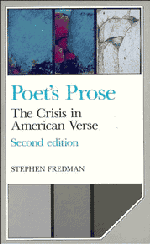Book contents
- Frontmatter
- Contents
- Preface to the second edition
- Preface to the first edition
- List of abbreviations
- Introduction: Prose and the American crisis of verse
- 1 The generative sentence: William Carlos Williams's Kora in Hell: Improvisations
- 2 “A life tracking itself”: Robert Creeley's Presences: A Test for Marisol
- 3 “He chose to include”: John Ashbery's Three Poems
- 4 The crisis at present: talk poems and the new poet's prose
- Notes
- Index
- Cambridge Studies in American Literature and Culture
3 - “He chose to include”: John Ashbery's Three Poems
Published online by Cambridge University Press: 04 April 2011
- Frontmatter
- Contents
- Preface to the second edition
- Preface to the first edition
- List of abbreviations
- Introduction: Prose and the American crisis of verse
- 1 The generative sentence: William Carlos Williams's Kora in Hell: Improvisations
- 2 “A life tracking itself”: Robert Creeley's Presences: A Test for Marisol
- 3 “He chose to include”: John Ashbery's Three Poems
- 4 The crisis at present: talk poems and the new poet's prose
- Notes
- Index
- Cambridge Studies in American Literature and Culture
Summary
A TRANSLATIVE PROSE
It is usually not events which interest Miss Stein, rather it is their “way of happening,” and the story of Stanzas in Meditation is a general, all-purpose model which each reader can adapt to fit his own set of particulars.
AshberyJust as Robert Creeley's early reference to Tristram Shandy provided clues to the nature of his conjectural prose, so John Ashbery's early review of Gertrude Stein's Stanzas in Meditation offers several avenues of entry into his own poet's prose. Stein's writing stands as an important example for the prose of all three of the poets examined at length in this study: To Williams, she provides a model for the determined use of the tactile qualities of words; to Creeley, she offers the model of a sustained and relentless investigation of language, which also takes on the intonation and cadence of incantation; to Ashbery, she embodies in writing “the way things happen,” a special kind of mimesis. And for the poets to be discussed in the final chapter, Stein also provides a significant example and impetus.
In his review of Stanzas in Meditation, entitled “The Impossible,” Ashbery describes aspects of Stein's poetry that recur in his own meditative poetry, especially the three long meditative prose pieces that constitute Three Poems: “The New Spirit,” “The System,” and “The Recital.”
- Type
- Chapter
- Information
- Poet's ProseThe Crisis in American Verse, pp. 101 - 135Publisher: Cambridge University PressPrint publication year: 1990



